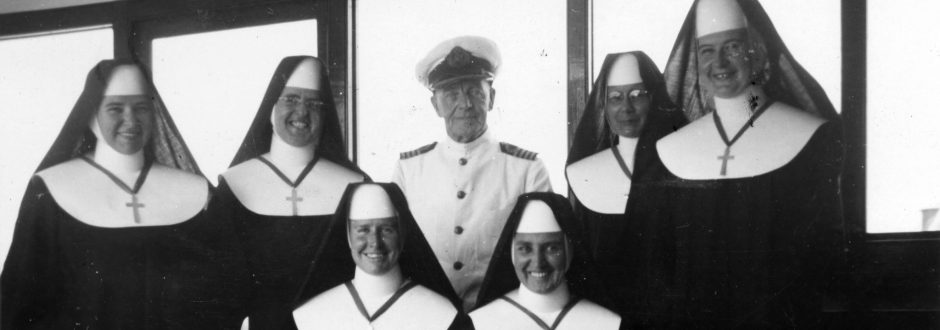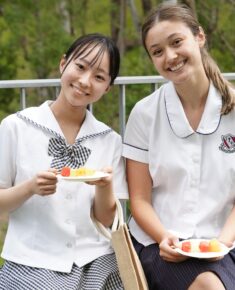Seiwa College in Sasebo, Japan, celebrated its 70th anniversary last month with a ceremony attended by five Sisters of the Good Samaritan in recognition of the Congregation’s role in founding and developing the school.
Congregational Leader Sister Catherine McCahill, who taught at the school for six months in the 1990s, delivered a speech at the anniversary celebration on 13 October. Former teacher and principal at Seiwa, Sister Hiro Kageyama, also attended, as did Sister Maree Nash, who taught at the school for 11 years, past teacher and principal Sister Etsuko Hattori, and past teacher Sister Johanna Yamawaki.
The link between the Seiwa school and the Sisters of the Good Samaritan began when six Australian Sisters set sail for Nagasaki to respond to the needs of the people there in the wake of the atomic bomb dropped on the city in 1945.
They had been invited by the Bishop of Nagasaki to help in the reconstruction of his diocese after the nuclear devastation. It was the first overseas mission established by the Australian Congregation.
When they first arrived in 1948, the Sisters set up a dispensary to help with the immediate medical needs of the people. The Good Samaritan mission continued as the Sisters ministered in kindergartens, parishes, and later went on to build Seiwa Middle and High School, in Sasebo – now known as Seiwa College. Seiwa means holy peace in Japanese.
In her remarks at the 70th anniversary celebration, Catherine spoke of the links between Seiwa College and the Sisters.
“I greet you today on behalf of the Sisters of the Good Samaritan. I have come for this special celebration to honour the history of this wonderful high school, to congratulate all of you and to encourage you to live, study and work in the traditions that we value,” she said.
“As Good Samaritans, we try to be good neighbours. This is the spirit and tradition that the first Sisters brought to this new school. They named it Seiwa: holy peace. They hoped and prayed that the girls who studied here would become women of peace, women who are good neighbours and good citizens.
“Today, I want to acknowledge what the Sisters discovered and learnt here. Countless women, men and girls taught the Sisters a new way of being neighbour.”
Catherine said in her six months teaching at Seiwa College in 1995, she came to understand the value of relationships – the welcome of the staff and students, the importance of the mothers’ club, and the alumni.
“May the young women who come here continue to learn the value of being good neighbours, may they be women of peace; good citizens in a world that needs peace. May the God who has blessed and enriched us all over the past 70 years continue to nourish and strengthen all of you. May Seiwa Joshi Gakuin flourish as a beacon of peace and hospitality in the Nagasaki prefecture and beyond,” she said.
Sister Hiro, who was born and raised in Tokyo, began teaching at the school in 1954 when she was an aspirant for the Sisters of the Good Samaritan and returned several times over the decades, including five years (2005-2010) as President of the School Corporation of Seiwa and two years as Principal and President. She said the school held a special place in her heart.
“Since the school was my first place to work, as an aspirant of the Good Samaritan Sisters, and the last place I worked in my 93 years of life, it is a very special place for me,” Hiro said.
“The Seiwa school is the cradle of my Good Samaritan life and the early Sisters’ lives were implanted and were imbued into my whole being. For me, the school means family, for which I pour out my affectionate concern.”
Hiro said she was delighted to attend the 70th anniversary celebrations. “I enjoyed seeing the students from the middle and high school, the teachers and staff, both current and former, the alumni, students’ families, civil representatives, and clergy,” she said.
“I also enjoyed hearing from the civil representatives, who are mostly non-Catholic, about their deep understanding and appreciation for what the Sisters have implanted in the spirit and tradition of the school in terms of being good neighbours and peacemakers and their firm willingness to transmit this spirit and tradition forward to the 80th anniversary and beyond.”
Hiro said another highlight for her were the comments by CardinalThomas Aquinas Manyo Maeda, the Archbishop of Osaka-Takamatsu, who was previously the parish priest at Sasebo and knew Seiwa College well.
Cardinal Maeda said people often use the term “Seiwa Family” when referring to the wider school community, something he felt indicated the warmth and affection that characterised the school.
He said God was clearly present in the school community and urged those present to keep on trusting that “God never leaves us alone”.
Sister Maree Nash who taught at Seiwa College from1989-1998 and 2001-2003, said the anniversary celebration was a happy occasion, which brought back many memories.
“Everyone was very hospitable. We received a warm welcome and it was lovely to see some of the teachers I worked with,” she said.
“My years at Seiwa were certainly challenging, being in a different culture and struggling with the language, but I was reminded of how, despite those challenges, you become part of the school community and get to know the staff, the students, and their families.
“I think it’s wonderful that Seiwa College, now run by the local diocese, is continuing with a presence of Christianity and the Good Samaritan charism. So, the tradition is there, and it continues and will be lived appropriately for the present and future time.”
This article was published in the November 2023 edition of The Good Oil.


